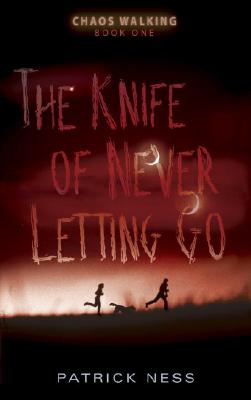 The Knife of Never Letting Go by Patrick Ness
The Knife of Never Letting Go by Patrick NessThis book glued itself to my fingers. I couldn't turn the pages fast enough, I couldn't read it fast enough. The speed of the story, the intensity of it, throttled me so that the only thing I could do was stay up long into the night and cram myself through the pages. Ness captures voices so finely and particularly that the characters burst out of them, and any extra description is just the layering of small detail because you've already heard them speak and you know, immediately, who they are.
It's not a subtle book, but it takes on a great deal of fear, anger, and violence, and the difference between running away from those things and facing them. It's the kind of story that needs the space that stripped down, broad strokes can give, and the characters are compelling enough so that you never feel like you are being dragged along behind them. You are inside the story with them, and you feel their world cracking open, and then closing in on them again. It's the most thrilling book I've read in a long time, as all the other ones that are meant to cause suspense and thrills have been distressingly tame lately. Not that they're necessarily bad, they just haven't been compelling enough for me to sacrifice my entire allotment of sleep to them.
The Sweetness at the Bottom of the Pie by Alan Bradley

This is (as one bookstore customer described this sort of book to me) "a cozy mystery despite the killing." I love the conceit of a very young, very brilliant, and very spoiled girl, who is also obsessed with chemistry, as the unofficial detective investigating a murder. I didn't find any of it believable, and the weird thing is that once I got over that, it didn't bother me very much. Flavia de Luce is only supposed to be eleven, but she doesn't sound like any eleven-year old I can imagine, not even the most prodigious or precocious. It's an easily consumed book, sprinkled with quirky details about chemistry and postage stamps, and every now and then Bradley manages these elegant, shiny turns of phrase that satisfy completely, but I didn't find the mystery of it very compelling.
Little Brother by Cory Doctorow

I had been meaning to read this for several months. I'm not sure why it took me so long to get around to it. It's a well put together story, and potentially a very important book because of the way it shows the world, and where it could be going, and what anyone with a decent amount of independent thought and desire can do about it. I liked the directness of it, the way it takes the plain honesty that some YA books can have and uses it as a way to deliver both a story about people and a story about technology and politics. It made me think, and it made me notice things. The characters feel like real people: they sound like teenagers and they do things that teenagers would do, and there's this whole mess of feelings and confusion and ideals that makes them seem more defined instead of less. I also couldn't put this one down.
***
Things I learned this week:
It's "Google-plex," not "Google-land."
We do not have any serious books on Opus Dei in our store. (however, I did meet a man who told me that he was a member of Opus Dei for 25 years. I had to tell him that the only thing I know about the organization is that Dan Brown makes use of it in The Da Vinci Code.)
Taxidermied horse heads are disturbing, even if they do have jolly looking smiles. They remind me of poor Falada in "The Goose Girl."

2 comments:
There's a new book out in Opus Dei called Women of Opus Dei: In Their Own Words (The Crossroad Publishing Company).
"Google-plex" perhaps to distinguish itself from "Disney-land" -- and if you haven't read The Goose Girl by Shannon Hale...I am reminding you!
Post a Comment